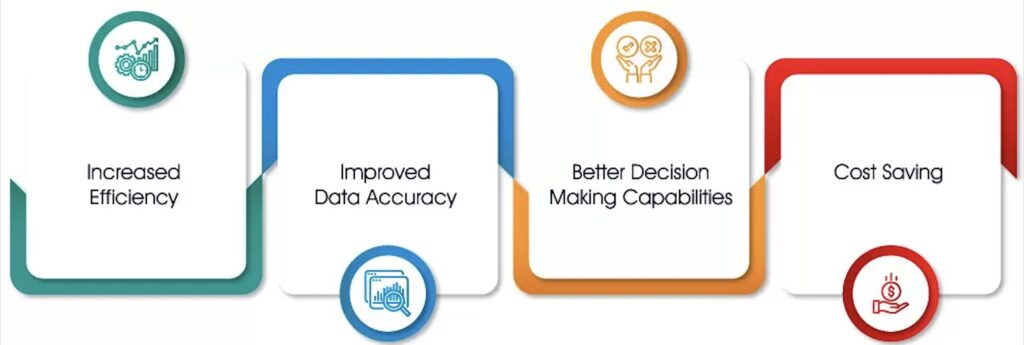ERP Solutions
Streamline your business processes with our powerful ERP Solutions
ERP Solutions
Enhance your operational efficiency and strategic decision-making with ERP system
ERP system automates and streamlines business processes and information across the entire organization, removes barriers that exist between departments and makes corporate data easily accessible. The purpose of ERP is to facilitate the flow of information and improve efficiency by centralizing data and automating tasks across different departments and functions within the organization.
ERP system includes multiple modules, each of which is typically designed to focus on maintaining workflow of a specific business area.
We develop custom made ERP system for businesses of all sizes and offer both in-premises and cloud-based ERP. Our ERP system is designed to provide organization a unified, centralized and real time view of data, enabling better decision making and streamlining processes.

ERP Modules We Offer
ERP system helps organizations with a centralized application to manage different departments and their functions. We implement modules based on customer’s requirement and ERP system can be customized to integrate additional functionalities as needed. Some of the most crucial modules of an ERP system we offer:
- Financial Management and Accounting
This module manages financial transactions, general ledgers, accounts payable and receivable, cash management, financial reporting, fixed assets and tax accounting.
- Human Resource management
HR module handles employee information, payroll processing, benefits administration, attendance and leave management, talent acquisition, performance management and training and employee self-service.
- Supply Chain Management
SCM module deals with procurement, supplier management, inventory control, demand forecasting, order processing, logistics, and distribution.
- Project and Costing Management
This module supports project planning, task allocation, resource management, time tracking, progress monitoring, and project budgeting.
- Inventory Management
This module tracks inventory levels, stock movements, reorder points, and stock valuation.
- Sales and Marketing
This module focuses on managing sales processes, customer data, lead management, quotes and proposals, order management, pricing, and marketing campaign tracking.
- Customer Relationship Management
The CRM module helps in managing customer interactions, customer data, sales opportunities, customer support and service and customer feedback.
- Manufacturing Management
This module assists in production planning, scheduling, work order management, bill of materials (BOM), quality control, shop floor management, and equipment maintenance.
- Service management
This module focuses on managing service-related processes, including service requests, service contracts, service delivery, and customer support.
- Assets Management
Assets can include physical assets (such as machinery, equipment, buildings) as well as intangible assets (such as intellectual property, software licenses, patents). This module manages assets life cycle, assets inventory and tracking, asset acquisition and depreciation, maintenance and repair, asset utilization and performance monitoring.
- Quality Control Management
The quality management module is responsible for managing quality control processes, inspections, non-conformance management, and quality reporting.
- Business Intelligence (BI)
This module provides tools for data analysis, reporting, and data visualization, helping users make informed decisions based on real-time data.
Cloud-based ERP

Our Cloud based ERP system brings the flexibility to manage business processes from anywhere and from any device with the use of internet connectivity. Designed for small to large enterprises, our cloud-based ERP system is compliant with security guidelines to ensure the crucial organizational data is safe and secure.
Benefits Of ERP System

ERP system streamlines business processes, automates routine task and keeps company’s information in one centralized database. Access control of the system is also managed through roles and permissions for data security. ERP system helps to boost organization’s overall productivity through execution of automated tasks and by managing data efficiently. Some of the key benefits of an ERP system are as follows
Streamlined processes
ERP integrates various business processes and functions and streamlines operations. This enhances productivity as employees can access data real time and collaborate more effectively.
Centralized data
ERP provides centralized database where all the information is stored, this ensures data consistency and accuracy. Unified view of data enables better decision making and reduces risk of errors.
Improved Reporting and Analytics
ERP system comes with built-in reporting and analytics that generates insightful reports and helps in data analysis effectively. This empowers management in decision making and identify areas of improvement.
Enhanced communication and collaboration
ERP facilitates communication and collaboration across different departments by providing a common platform for sharing information. This fosters better teamwork and coordination among employees.
Cost Saving
Streamlining processes and automation of tasks helps organization to save labor cost and improve resource utilization. So, investing in ERP system can lead to cost saving in long run.
Increased Visibility and Transparency
ERP provides real-time visibility into various aspects of the business, such as inventory levels, sales performance, and financial data. This transparency allows management to identify issues promptly and respond proactively.
Scalability
ERP systems are designed to accommodate the growth of an organization. They can scale as the business expands, making them suitable for both small businesses and large enterprises.

Looking for ERP Solution?
If you are looking for ERP Solution for your organization, let’s discuss your requirement. Our consultants will help you implement ERP system for your business processes.